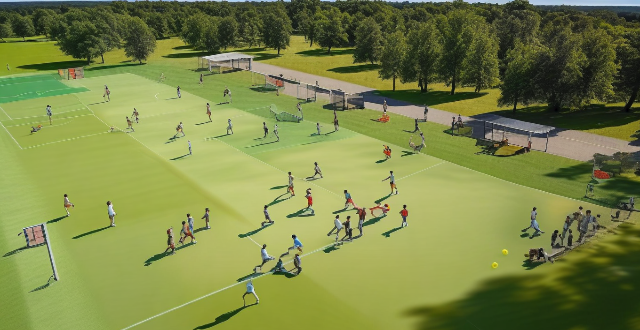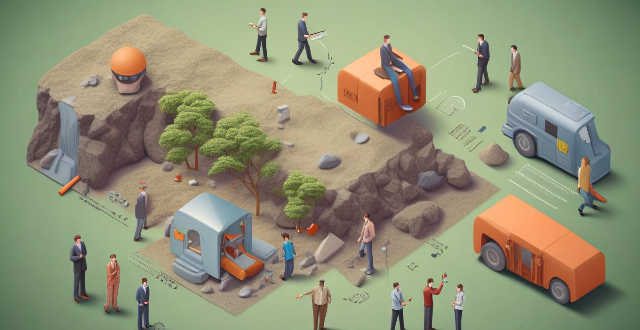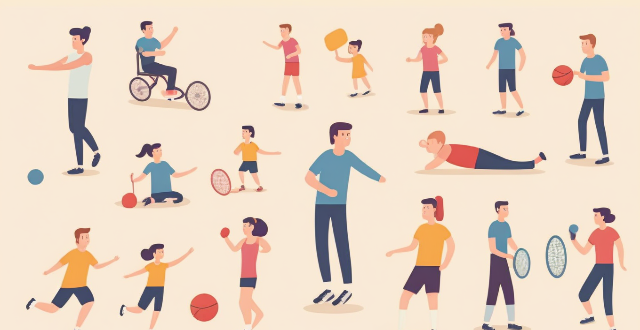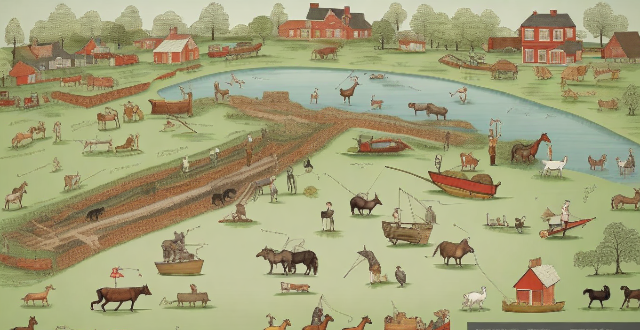Development Leadership

How can companies support the development of female leadership talent ?
Companies can support the development of female leadership talent by implementing a variety of strategies and programs that address the unique challenges faced by women in the workplace. Here are some key ways to foster female leadership: 1. Create a diverse and inclusive culture 2. Provide mentoring and sponsorship opportunities 3. Offer professional development programs 4. Foster a collaborative work environment 5. Set clear goals and measure success

What is the influence of sports on leadership skills development among adolescents ?
This article discusses the influence of sports on leadership skills development among adolescents. It highlights the importance of leadership skills and how sports can contribute to their development through communication, problem-solving, decision-making, teamwork, and self-motivation. The article concludes that sports have a significant impact on the development of essential leadership qualities that are important for success in various aspects of life.

What is the impact of sports programs on the leadership development of students ?
Sports programs in educational institutions have a profound impact on the leadership development of students. These programs provide opportunities for students to develop essential leadership skills such as teamwork, communication, decision-making, and problem-solving. In this article, we will discuss the various ways in which sports programs contribute to the leadership development of students. One of the most significant benefits of participating in sports programs is the opportunity to work with others towards a common goal. This experience teaches students how to collaborate effectively, communicate clearly, and support their teammates. These skills are essential for successful leadership, as leaders must be able to work collaboratively with their team members to achieve their objectives. Participating in sports programs also helps students develop strong communication skills. Athletes must be able to communicate effectively with their coaches, teammates, and even opponents during competitions. This experience teaches students how to convey their thoughts and ideas clearly and persuasively, which is an essential skill for leaders. Sports programs also provide opportunities for students to develop decision-making and problem-solving skills. Athletes must make split-second decisions during games and matches, often under pressure. This experience teaches students how to analyze situations quickly and make informed decisions based on the available information. Finally, sports programs teach students how to set goals and work towards achieving them. Athletes must set personal and team goals, create plans to achieve them, and track their progress along the way. This experience teaches students how to set realistic goals, develop strategies to achieve them, and persevere through challenges. In conclusion, sports programs have a significant impact on the leadership development of students. By providing opportunities for teamwork, communication, decision-making, problem-solving, and goal setting, sports programs help students develop essential leadership skills that they can apply in other areas of their lives. As educators and parents, it is our responsibility to encourage our children to participate in sports programs and support their growth as leaders both on and off the field.

How can education institutions foster climate leadership among students ?
Education institutions can foster climate leadership among students through curriculum integration, extracurricular activities, infrastructure improvements, collaboration and partnerships, and policy and leadership support. By adopting these strategies, they can contribute to global efforts in mitigating climate change.

How can schools effectively cultivate student leadership skills ?
Schools can cultivate student leadership skills by creating opportunities for leadership roles, encouraging teamwork and collaboration, providing training and workshops, fostering a culture of respect and inclusivity, and offering mentorship programs.

How has the #MeToo movement influenced perceptions of female leadership ?
The #MeToo movement has increased awareness of gender bias and prompted changes in corporate culture, leading to greater representation of women in leadership roles. However, challenges remain in achieving true gender equality.

How does female leadership differ from male leadership ?
Female and male leaders exhibit distinct characteristics in communication, decision-making, management styles, emotional intelligence, and negotiation tactics. Female leaders often prioritize collaboration, consensus, and empathy, while male leaders tend to be more directive, risk-prone, and competitive. Recognizing these differences can foster diverse leadership environments that value a range of perspectives and strengths.

What role does communication play in sports leadership ?
Communication is vital for sports leadership, helping achieveCommunication is vital for sports leadership, helping achievehesion, and foster a helping achieve success, build team cohesion, and foster a positive environment. Clear and concise messaging, active listening, encouragement, and motivation are key components of effective communication in sports leadership. Benefits of effective communication include increased performance, improved team cohesion, enhanced athlete development, and greater satisfaction and retention.

How does climate leadership differ from traditional forms of leadership ?
Climate leadership is a specialized form of leadership that focuses on addressing the challenges and complexities associated with climate change. It differs from traditional forms of leadership in several key ways, including its scope, urgency, collaborative nature, and long-term perspective. Climate leadership addresses global issues that affect the entire planet and all its inhabitants, while traditional leadership often focuses on organizational goals, profits, or specific projects. Climate leadership operates with a sense of urgency due to the accelerating pace of climate change, while traditional leadership may operate on a more relaxed timeline. Climate leadership emphasizes horizontal integration and networked governance structures, engaging with external stakeholders such as governments, NGOs, and international bodies. In contrast, traditional leadership typically operates within a hierarchical structure where decision-making is centralized. Climate leadership considers the long-term implications of decisions for future generations and prioritizes sustainable practices that balance economic growth with environmental stewardship. Traditional leadership tends to focus on quarterly results or annual performance targets and may prioritize short-term gains over long-term sustainability. Climate leadership encourages innovation and experimentation to find new solutions to complex problems and fosters a learning environment where failure is seen as an opportunity for growth. Traditional leadership may rely on established methods and processes and can be resistant to change if it disrupts current operations. Finally, climate leadership places ethical considerations at the forefront, acknowledging the moral imperative to act and recognizing the interconnectedness of environmental health with social equity and justice. In contrast, traditional leadership is often centered on legal compliance and shareholder value, with ethics being secondary to profitability and efficiency. In summary, climate leadership demands a broader vision, greater urgency, extensive collaboration, a long-term outlook, continual innovation, and a strong ethical foundation. It requires leaders who are not only skilled in their respective fields but also possess a deep understanding of environmental issues and the ability to inspire collective action towards a more sustainable future.

How does sports leadership differ from other types of leadership ?
Sports leadership is distinguished by its goal-oriented focus, clear team hierarchy, emotional intensity, physical component, short-term outcomes, public scrutiny, adaptability, and cultural impact. Unlike other types of leadership, sports leaders must manage high levels of emotion, direct physical performance, and adapt quickly to changing circumstances during a game. They also play a significant role in shaping the culture and values of their team, which can have a profound impact on the wider community.

How can we encourage more women to pursue leadership roles ?
Encouraging Women to Pursue Leadership Roles - **Education and Awareness**: Promote STEM education, highlight role models, address gender stereotypes. - **Workplace Policies and Practices**: Establish flexible work arrangements, provide mentorship programs, enforce anti-discrimination laws. - **Networking and Professional Development**: Sponsor women's networking events, offer leadership training programs, create women-specific scholarships. - **Cultural Change and Empowerment**: Promote a culture of inclusivity, address the confidence gap, celebrate women's achievements.

What are the benefits of fostering leadership in students from a young age ?
Fostering leadership in students from a young age has numerous benefits, including enhanced personal development, improved social skills, increased confidence, better academic performance, preparation for future roles, and a positive impact on society. Leadership training helps students develop valuable skills such as decision-making, problem-solving, time management, communication, collaboration, and empathy. These skills are beneficial in academic settings and personal lives, leading to well-liked and respected individuals. Taking on leadership roles also builds confidence and self-esteem, translating into other areas of life, including academic performance and future career prospects. Research shows that students with strong leadership qualities tend to perform better academically due to effective study habits, time management skills, and a strong work ethic. Fostering leadership prepares students for future roles in the workplace, community organizations, and political arenas, setting them up for success later in life. Developing strong leaders from a young age creates an engaged and active citizenry capable of addressing complex issues and working towards positive change.

How do academic challenges, such as debate teams or science competitions, promote leadership skills in students ?
Academic challenges such as debate teams and science competitions promote leadership skills in students by fostering critical thinking, collaboration, innovation, problem-solving, self-confidence, time management, and interpersonal skills. These skills are essential for effective leadership and can help students succeed both academically and professionally.

How can sports help individuals develop leadership skills and personal growth ?
Participating in sports can help individuals develop leadership skills and foster personal growth by enhancing goal-setting, teamwork, resilience, decision-making under pressure, accountability, confidence building, discipline, physical health, emotional intelligence, and social interaction.

How can climate leadership be integrated into urban planning and development ?
Integrating Climate Leadership into Urban Planning and Development: - **Introduction**: The importance of climate leadership in urban planning and development is discussed. - **Key Strategies for Integrating Climate Leadership**: Four main strategies are outlined: sustainable transportation, energy efficiency, green spaces and parks, and resilience planning. - **Sustainable Transportation**: Encourage public transportation, develop bicycle infrastructure, and promote walking to reduce carbon emissions and alleviate traffic congestion. - **Energy Efficiency**: Implement strict building codes and standards, promote renewable energy sources, and utilize smart technologies to optimize energy consumption. - **Green Spaces and Parks**: Plant trees, create community gardens, and develop waterfront areas while protecting natural habitats and ecosystems. - **Resilience Planning**: Implement flood risk management strategies, adopt wildfire prevention measures, and plan land use based on climate projections and vulnerabilities. - **Conclusion**: Integrating climate leadership into urban planning and development is crucial for creating resilient cities that can adapt to the challenges posed by climate change.

In what ways do women contribute uniquely to leadership roles in the workplace ?
Women's contributions to leadership roles in the workplace include empathy, emotional intelligence, inclusivity, collaborative leadership, adaptability, communication skills, and innovative thinking. These qualities can lead to more compassionate and diverse work environments, effective decision-making, and creative problem-solving.

How can sports leadership training programs benefit coaches and athletes ?
Sports leadership training programs can greatly benefit coaches and athletes by enhancing their skills and knowledge, leading to improved performance on and off the field. Coaches can improve communication, leadership qualities, motivation techniques, goal setting, and tactical knowledge, while athletes can develop self-confidence, teamwork skills, responsibility, time management, and mental toughness.

How do extracurricular activities contribute to the development of student leaders ?
**The Role of Extracurricular Activities in Nurturing Student Leaders** **Skill Development:** Extracurricular activities offer a platform for students to acquire and refine various skills, such as communication, teamwork, time management, and problem-solving. **Confidence Building:** Involvement in extracurricular activities often leads to increased self-assurance through taking initiative and overcoming challenges. **Interpersonal Abilities:** Engaging in extracurricular activities fosters key interpersonal abilities like networking, empathy, emotional intelligence, and influence. **Real-World Experience:** Extracurricular activities simulate real-world experiences where leadership is crucial, teaching organizational skills and adaptability. **Responsibility and Commitment:** Participation teaches responsibility and commitment through accountability and dedication to practice or training. **Conclusion:** Extracurricular activities serve as a laboratory for students to experiment with leadership styles, make mistakes, learn from them, and grow into well-rounded individuals ready to take on future challenges.

How do competitive sports influence social development and teamwork skills ?
Competitive sports play a significant role in shaping individuals' social development and enhancing their teamwork skills. This essay explores the various ways in which competitive sports influence these aspects of personal growth, including increased social interaction, building confidence and self-esteem, learning to deal with success and failure, collaboration, communication skills, leadership development, and responsibility and accountability. These skills are not only valuable in sports but also transferable to various aspects of life, making competitive sports an essential component of personal growth and development.

What are the benefits of extracurricular activities for teenage development ?
This article discusses the benefits of extracurricular activities for teenage development, including improved social skills, personal growth and self-discovery, academic success, physical health and well-being, and lifelong skills and habits.

How do sports teach important life skills such as teamwork, perseverance, and leadership ?
The text discusses how sports teach important life skills, including teamwork, perseverance, and leadership. In sports, teamwork is crucial for success, requiring communication, cooperation, and understanding each other's strengths and weaknesses. Athletes learn to collaborate effectively with others, which can be applied in various aspects of life. Sports also teach perseverance by exposing athletes to challenges and setbacks, developing resilience and determination. Participating in sports provides opportunities for individuals to develop leadership skills, such as taking initiative, motivating teammates, and being responsible for the team's success or failure. These skills not only contribute to success in athletics but also have far-reaching benefits in various aspects of life.

What role do governments play in promoting sustainable development ?
The article discusses the various ways governments can contribute to sustainable development, including leadership and policy-making, education and awareness, infrastructure and investment, regulation and enforcement, and collaboration and partnership. Governments are responsible for setting national policies and priorities that guide the actions of their citizens and businesses, promoting sustainable development through education and public awareness campaigns, investing in infrastructure projects that support environmental protection, energy efficiency, and renewable energy sources, enforcing existing laws and regulations related to environmental protection, resource management, and social equity, and working together with other levels of government, the private sector, civil society, and international organizations to achieve common sustainability goals.

What should I look for in a school's extracurricular activities program ?
When considering a school's extracurricular activities program, look for diversity of options, quality leadership, opportunities for growth and development, and inclusivity and accessibility. A well-rounded program will foster personal growth, leadership skills, and community among participants.

How does sports affect the physical development of adolescents ?
Sports during adolescence positively impact physical development by enhancing muscular strength, improving bone density, promoting coordination and balance, managing body composition, benefiting cardiovascular health, and fostering mental well-being. Additionally, they encourage active lifestyle habits and social interaction, setting a foundation for lifelong health and wellness.

What resources are available for career planning and development ?
This text provides an overview of various resources available to support career planning and development. It covers online courses, networking opportunities, mentorship programs, job boards, personal development books and podcasts, coaching services, government and non-profit resources, university career services, company ERGs, and industry publications. These resources aim to enhance skills, expand networks, and keep individuals informed about opportunities that align with their career goals.

How can educators identify and nurture potential leaders within their classrooms ?
Educators play a pivotal role in identifying and nurturing potential leaders within their classrooms. They can do this by observing student behavior, assessing interests and abilities, recognizing diverse leadership styles, providing opportunities for leadership development, offering mentorship and support, and fostering a positive learning environment. By following these steps, educators can effectively identify and nurture potential leaders within their classrooms.

How can climate cooperation contribute to sustainable development goals ?
Climate cooperation plays a crucial role in achieving the United Nations' Sustainable Development Goals (SDGs), which aim to ensure that all people have access to the resources they need to live healthy, productive, and sustainable lives. By working together on climate action, nations can make significant progress towards several SDGs, including those related to poverty, hunger, health, education, gender equality, clean water and sanitation, affordable and clean energy, economic growth, and partnerships for the goals. Climate cooperation helps reduce the impacts of extreme weather events, natural disasters, and climate change on vulnerable communities, thereby contributing to poverty eradication efforts. It supports sustainable agricultural practices and promotes resilient food systems, ensuring food security and nutrition for all. Climate action helps reduce air pollution and improve public health outcomes, contributing to better respiratory health and overall well-being. Engaging women and girls in climate actions promotes gender equality by providing opportunities for leadership and participation in decision-making processes. Climate cooperation helps protect water resources from climate-related hazards, ensuring access to clean water and sanitation for all. Collaborative efforts in renewable energy research, development, and deployment contribute to universal access to affordable, reliable, and modern energy services. Climate cooperation creates green jobs and promotes sustainable economic growth, particularly in industries such as renewable energy and sustainable agriculture. Partnerships formed through climate cooperation drive innovation in sustainable technologies and infrastructure, fostering industrial development while minimizing environmental impacts. By addressing climate change, which disproportionately affects marginalized communities, climate cooperation helps reduce social and economic inequalities both within and among countries. Climate actions support urban planning and management that enhances inclusivity, resilience, and environmental sustainability in cities and human settlements. Climate cooperation encourages responsible consumption patterns and sustainable production methods, reducing waste and environmental degradation. This goal is directly linked to climate cooperation as it involves taking urgent action to combat climate change and its impacts. Through ocean conservation and sustainable fishing practices, climate cooperation helps protect marine ecosystems and biodiversity. By promoting sustainable land use and forest management, climate cooperation contributes to the conservation of terrestrial ecosystems and biodiversity. Climate cooperation builds peaceful societies and effective governance structures capable of managing environmental challenges and conflicts arising from resource scarcity. Climate cooperation itself is a form of international partnership that leverages collective action to achieve the SDGs more effectively. In conclusion, climate cooperation is not only essential for mitigating the effects of climate change but also for advancing the broader agenda of sustainable development. By integrating climate actions into national policies and international collaborations, we can work towards a future where environmental protection, social equity, and economic prosperity are mutually reinforcing goals.

How can women improve their leadership skills ?
The article outlines strategies for women to enhance their leadership skills, including self-awareness and confidence, continuous learning, effective communication, emotional intelligence, building relationships, and taking initiative.

How do academic competitions contribute to a student's overall development ?
This article discusses the benefits of academic competitions in contributing to a student's overall development. It highlights how these competitions enhance academic achievement by boosting confidence, developing critical thinking skills, and encouraging independent learning. The article also emphasizes the role of academic competitions in promoting personal growth by building resilience, promoting teamwork, and developing time management skills. Furthermore, it points out how these competitions contribute to professional development by exploring potential career paths, gaining recognition and awards, and expanding networking opportunities. Overall, the article concludes that participating in academic competitions provides students with valuable experiences that can benefit them throughout their lives.